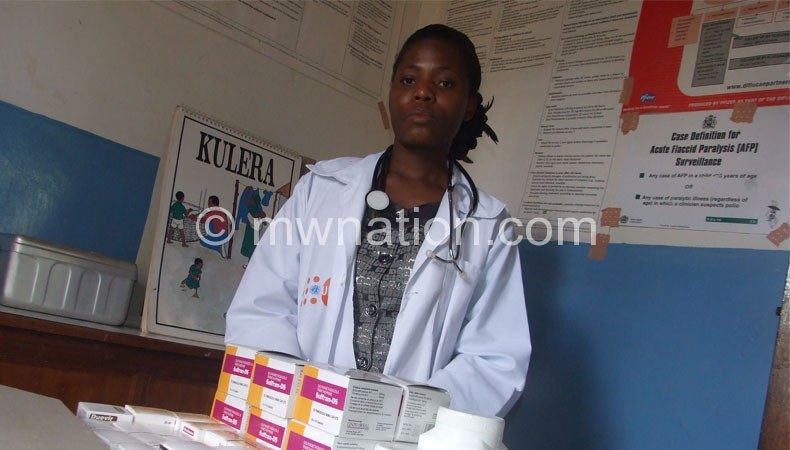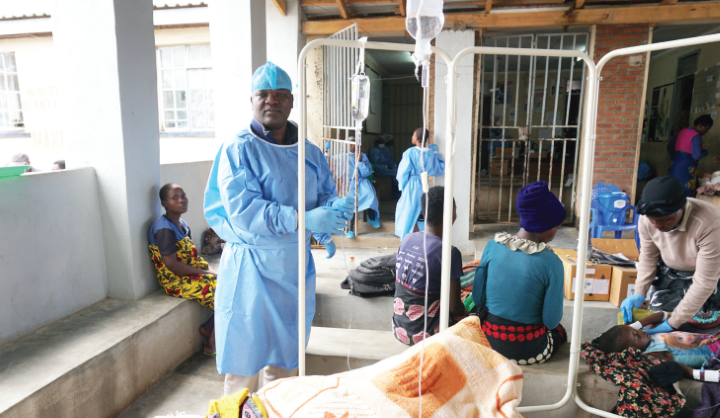Death of a forgotten mother

Some contrasts are stunning. Such was the outpouring of midwives at Mzenga Health Centre, a far-flung facility where four health workers see about 60 outpatients every day, excluding 15 pregnant women.
“The sight of so many health workers at once is a dream, isn’t it?” said Kabunduli Area Development chairperson Fanny Mphande.
Nkhata Bay district health officer, Dr Albert Mkandawire, praised the spectacle as the first International Day of the Midwife to happen in a rural area since the country embraced the observance 10 years ago.
Mphande’s reaction is not incredible though. The facility which locals want upgraded to a rural hospital has two midwives who handle the delivery of up to three babies daily.
“The health centre is small, although it serves the whole T/A Kabunduli. It is also understaffed. When one of the health workers is away or taken ill, the patients, including pregnant women, suffer needless delays to get the services,” Mphande says.
As the centre’s personnel joined the crowd in the ceremony graced by Minister of Health Catherine Gotani-Hara, there were six pregnant women in its waiting room. Some of them, together with the outpatients trickling in, had to endure long waits for medical attention as there was only one health worker on standby.
In their wait, they brought to life the fatal delays pregnant women are being subjected to at a time figures show 675 lives are lost for every 100 000 live births.
The maternal mortality rate remains “one of the worst globally” as Millennium Development Goals (MDG) require the country to cut back to just 155 deaths per 100 000 live births by next year, says UNFPA Country Representative Rogaia Abdelrahim.
Nkhata Bay district commissioner Fred Movete is happy that communities are coming up with by-laws to ensure that even those who are not informed about the need to look for antenatal care during pregnancy do not deliver at home or on the way.
Located slightly over 30km from Kavuzi Trading Centre along the Mzuzu-Nkhata Bay Tarmac and 15km from Chisala Health Centre, the understaffed Mzenga Clinic confirms government’s acknowledgement that most of women and children die because health facilities are too far apart and most of the time there is no transport or ambulance to take them there when labour starts.
The health centre has no ambulance and delays created by the long wait for ambulances from Nkhata Bay Hospital, nearly 50km away, worsens the situation at a time the women die while giving birth because there is not enough midwives available to take care of them.
Mphande says some resort to traditional birth attendants and deliver at home where the risks are numerous.
The Ministry of Health warns that delivering babies without skilled assistance exacerbates the likelihood of deaths due to maternal complications.
In an interview, Mwai Kamwendo, the in-charge of Mzenga Health Centre, said no woman has died giving birth at the public facility even though the restricted workforce does the job of about six personnel—making them symbols of triumph against adversity.
The staff comprises one medical assistant, two nurse-cum-midwife technicians and one community midwife. By contrast, government standards require every health centre to have two nurses, two midwives and two public health personnel.
“When some are away, it means we have to work day and night,” says Kamwendo, whose centre sees about 50 patients every day, including 15 pregnant women. Up to three deliver babies daily.
Although she has never witnessed maternal deaths since her arrival in 2009, Kamwendo recalls vividly how a woman from Chesamu Zone, whose health centre has no requisite staff to date ,was pronounced dead on arrival.
She narrated: “Since there was no midwife at nearest facility [Chesamu], relatives decided to take her to Chintheche Health Centre. However, she delivered in transit. They decided to return home immediately, but she started bleeding profusely when they arrived.
“Unfortunately, they had brought her dead and her child died a week later at Nkhata Bay District Hospital.”
The death of the woman, whose name was not recorded at Mzenga, spectacularly brings to life how women face the risk of dying in what is supposed to be the advent of happiness, not the genesis of mourning.
Sometimes, they don’t just die of bleeding or infections, high blood pressure, unsafe abortions, malaria, HIV or anaemia—all of which can be prevented with the right healthcare. Some die because there are not enough midwives available to take care of them in the hour of need and there was no ambulance to hurry her to better-staffed alternatives.
In an interview, the DHO Dr Mkandawire said plans are underway to station an ambulance at Chitheka because it is a “totally unnecessary delay to wait for one from Nkhata Bay about 30km away”.
“Presently, Nkhata Bay has three ambulances serving all its health facilities. The rest have either broken down or beyond repair. This really affects how we respond to critical cases, for it is unfair to keep women waiting when labour is strong,” he says.
Additionally, the DHO indicates that the district, which requires 154 midwives, has only 70 bedside midwives. The overstretched workforce handles delivery of 10 800 childbirths a year.
To address maternal mortality and contribute towards the MDGs on reducing maternal health by 75 percent by next year, Malawi embraced the Road map for Accelerating the Reduction of Maternal Mortality and Morbidity which makes a commitment to enhancing staffing and transport resources in hard-to-reach areas.
Minister of Health Catherine Gotani Hara agrees there is need to invest more in resources for health to save mothers and children lives, particularly now that safe motherhood is high on government’s agenda.
“Death of every woman is a concern to government. That is why President Joyce Banda is working with chiefs to promote safe motherhood to ensure every woman delivers in health facility with skilled personnel. Surely, this calls for greater investment in training and retaining health workers as well as ambulances,” she says.
This is pleasing to every ear, but Nurses and Midwives Council of Malawi last year reported that the country has 11 122 midwives in about 750 facilities and only 2780 provide full-time midwifery. Apart from making sure every pregnancy and newborn is safe, others work as nurses in adult sections.
Clearly, proper partnerships, good governance and regular inspection can help close some of the gaps which are surmountable.
There is need to graduate from just talking, for the Gender Equality Act affirms access to quality sexual reproductive health is a right every woman should enjoy.





